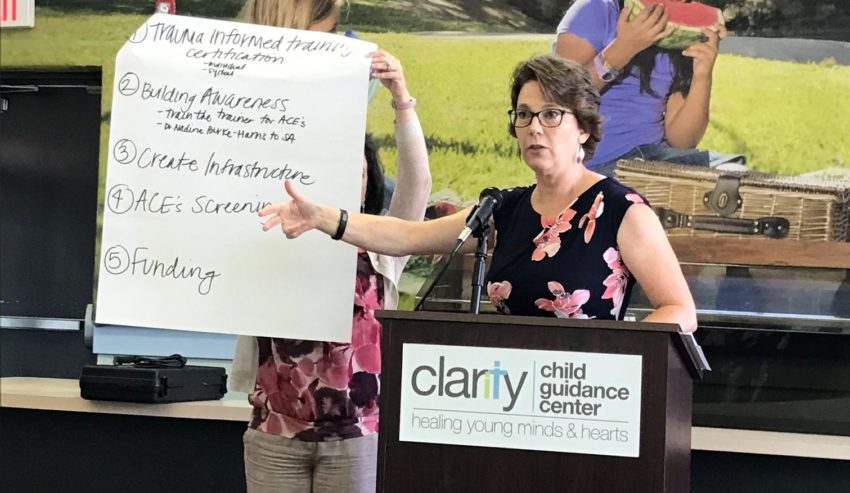
Share On Social!
Dr. Colleen Bridger knows the devastating effects of childhood trauma, from risky behavior to bad grades, to even chronic disease.
Bridger saw many childhoods ruined by abuse, poverty, and other trauma in her 20 years running three health departments and a childhood research/advocacy group in North and South Carolina.
Health departments rarely coordinate with schools, healthcare providers, police, the justice system, and family support groups to address and reduce the impact of childhood trauma.
Bridger wanted to change that.
Since taking over as head of the San Antonio Metropolitan Health Department in 2017, she has worked to create a network of coordinated trauma-informed care for children and families facing adversity, even creating city’s first-ever job dedicated solely to this issue.
Has it worked?
Public Health Interrupted
Bridger spent the 2000s running health departments in North Carolina’s Gaston and Stokes counties.
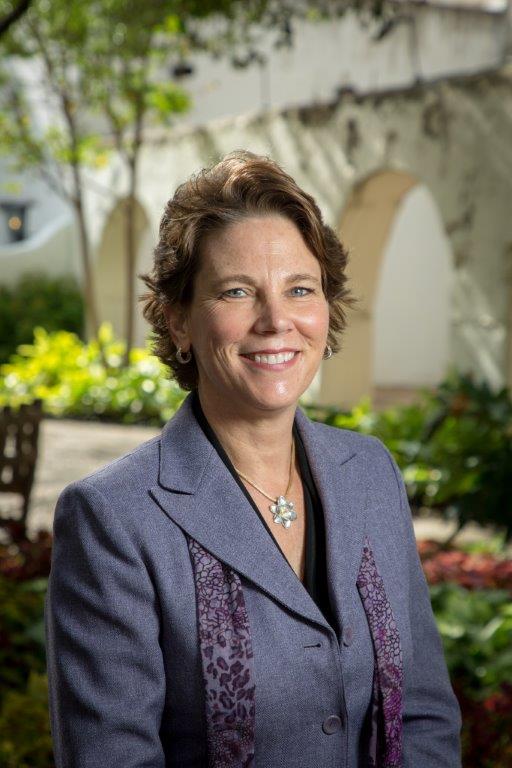
Public health was her life. But she took a sabbatical in 2010.
At that time, she was the founding Executive Director of the Institute for Child Success in South Carolina. The nonpartisan research and policy organization facilitates public-private partnerships to coordinate resources for the success of young children.
Bridger also immersed herself in research on early childhood development and adverse childhood experiences (ACEs). She brought together coalitions of public, private, philanthropic, and community stakeholders on child health. Her group also advocated for a unique funding structure—Pay For Success—for a South Carolina nurse-family partnership for child health.
And, for the first time, she fully grasped the magnitude of childhood adversity on public health.
“We spend so much time when they get to high school, we need to flip the paradigm to invest when their brains are developing at a faster rate,” Bridger said.
A Return to Public Health, with ACEs in Focus
Bridger was ready to return to public health with a new focus: mitigate the health effects of ACEs.
When she took over as director of the Orange County Health Department in Hillsborough, North Carolina, in 2011, she began working to make the department the backbone of a collaborative trauma-informed care effort in two neighborhoods where a large proportion of families were struggling to make ends meet.
“These children’s brains are developing around the belief that the world is a dangerous place to be feared and we want them to see that there are a tremendous number of people in their community who are able and willing to provide the safe, stable and nurturing environment they need to change that world view and help them heal from their trauma,” Bridger said.
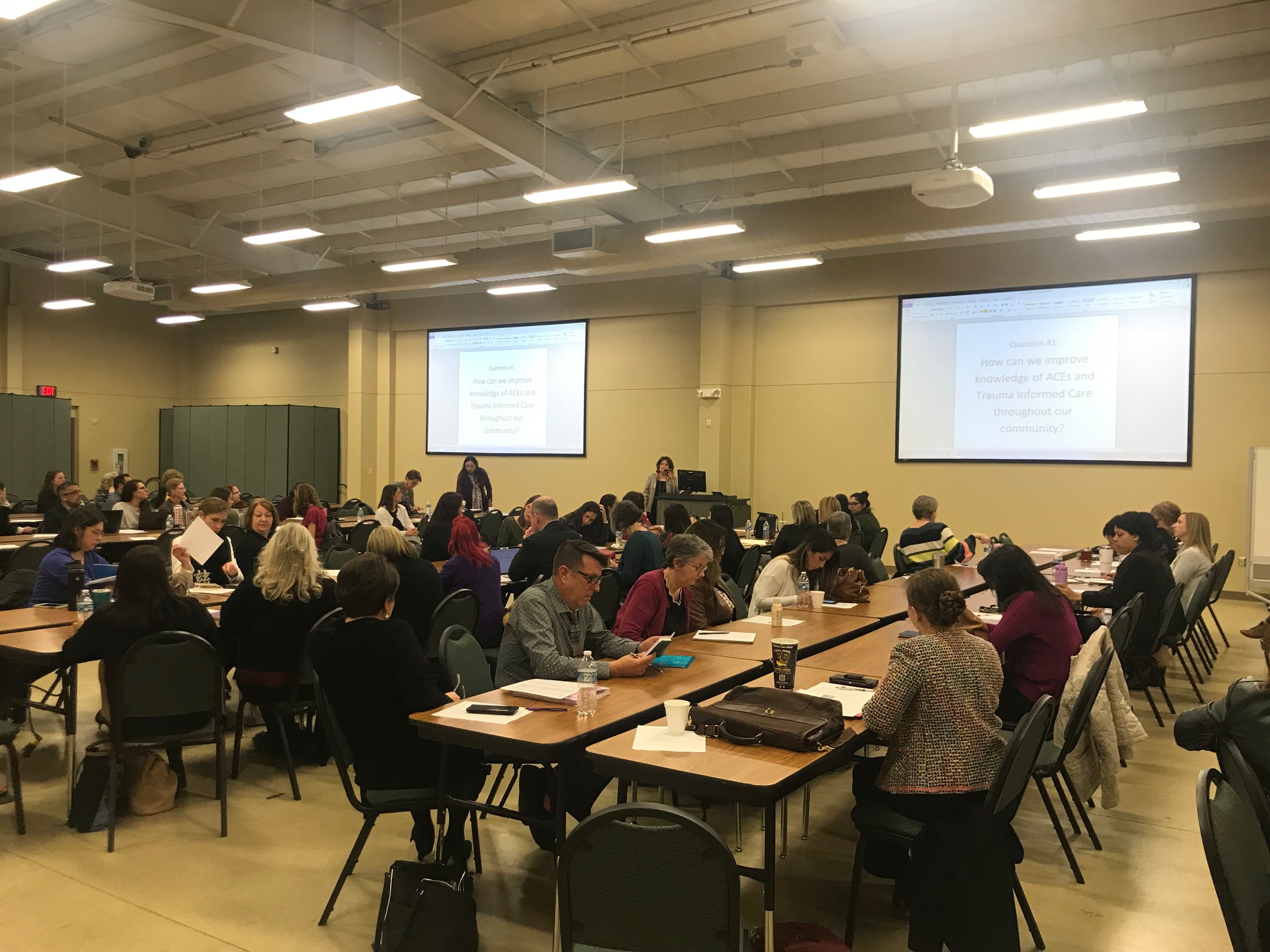
Known as The Family Success Alliance, it was a community-led effort, based on the national Promise Zone model, where local navigators connect kids and families with resources to build resilience and a pipeline for success at an early age through adulthood.
“Supporting kids from cradle to career is about preventing and mitigating childhood trauma,” Bridger said.
Working with the local United Way, the Health Department convened community stakeholders dedicated to child success and collectively developed a new funding mechanism that tied each of these United Way Partner organizations to the pipeline.
Preliminary evaluations showed children participating in the Family Success Alliance had statistically significant improvements in kindergarten readiness and school testing.
Taking a Fresh Look at Health in San Antonio
In March 2017, Bridger moved to Texas to become director of the San Antonio Metropolitan Health District.
Bridger actually is the city’s first health director in recent memory who is not a medical doctor, according to the Rivard Report. She has a PhD in health services research.
She said this helps her hone in on upstream social determinants, like childhood trauma.
“Someone who can really advocate on behalf of looking at the social determinants of health [is] going to have a bigger impact on social determinants of health than a physician who has been trained to look at the patient one patient at a time,” she said at the time.
Galvanizing Emerging Trauma-Informed Efforts in San Antonio
Bridger started introducing the issue of ACEs to San Antonio health and city officials.
Yet, even before Bridger arrived, key players were laying the groundwork for trauma-informed care.
Dr. Kathy Fletcher, leader of Voices for Children in San Antonio, had spent six years training early care providers on childhood trauma and connecting them to local resources and services.
Fletcher and the Voices program have long advocated for critical issues that impact child well-being. They also collaborate with local and state organizations to improve programs, practices, and policy.
“These children’s brains are developing around the belief that the world is a dangerous place to be feared and we want them to see that there are a tremendous number of people in their community who are able and willing to provide the safe, stable and nurturing environment they need to change that world view and help them heal from their trauma,” Fletcher said.
Fletcher and Bridger made a fast connection.
At one of Fletcher’s early care provider training sessions, Bridger did an ACEs survey.
“Of the 200 [providers], 33% reported four or more ACEs,” Fletcher said.
For reference, in the original ACEs study, only 12.5% had four or more ACEs, according to the Centers for Disease Control and Prevention.
As the number of ACEs increases, so does the risk for negative outcomes, like obesity, anxiety, withdrawal, aggression, substance abuse, attention problems, unintended pregnancy, diabetes, and cancer, according to a Salud America! Research Review.
“Attendees recognized that they needed to address their own trauma in order to do the best job they can,” Bridger said.
Bridger and Fletcher also learned about a few schools that were changing their attitudes about discipline. One was East Central ISD, where 3 of 4 students are Latino.
John Hernandez, the director of student services at East Central ISD, created a task force in 2016 to learn about the impact of child trauma, reverse attitudes about consequences, and help children heal from trauma. With Hernandez’s input, Salud America! even created an action pack to enable other schools to become trauma-sensitive, too.
“Enough people have been through adversity that it sparks an understanding and hopefully that will lead to more support,” Fletcher said.
The San Antonio Children’s Shelter also works to understand trauma and provide trauma-informed care for children facing abuse, neglect, abandonment, and other ACEs.
Yvette Sanchez, chief operating officer at the Children’s Shelter, said their licensed trauma-informed care is the “lens and thread” of how they serve children.
“So many times, we see a child coming into care and then years later the child may be in foster care or a teen parent,” Sanchez said. “These children had so much adversity and trauma in their life, but people and systems they worked with weren’t really trauma-informed, so they only received band-aids.”
How could all of these key players and efforts come together?
Uniting People for Trauma-Informed Care in San Antonio
The Children’s Shelter started a trauma-informed care task force to meet monthly to keep up with ongoing training and monitoring and discuss additional steps.
The task force had ideas for two big projects.
One was the Children’s Shelter’s inaugural South Texas Trauma-Informed Care Conference in May 2018.
The second project was starting a trauma-informed consortium, modeled after one in Central Texas.
“It’s all about awareness and connection,” Sanchez said.
Nearly 200 local attendees—including Bridger, Fletcher, Sanchez, and Hernandez—stayed after the conference to brainstorm how to continue shining a light on the issue of ACEs in the San Antonio area.
This was the birth of the consortium.
The Children’s Shelter organized a second brainstorming session in June 2018 and over 100 people attended. They prioritized overarching strategies; identified different sectors that come into contact with children and families; and identified sector leaders.
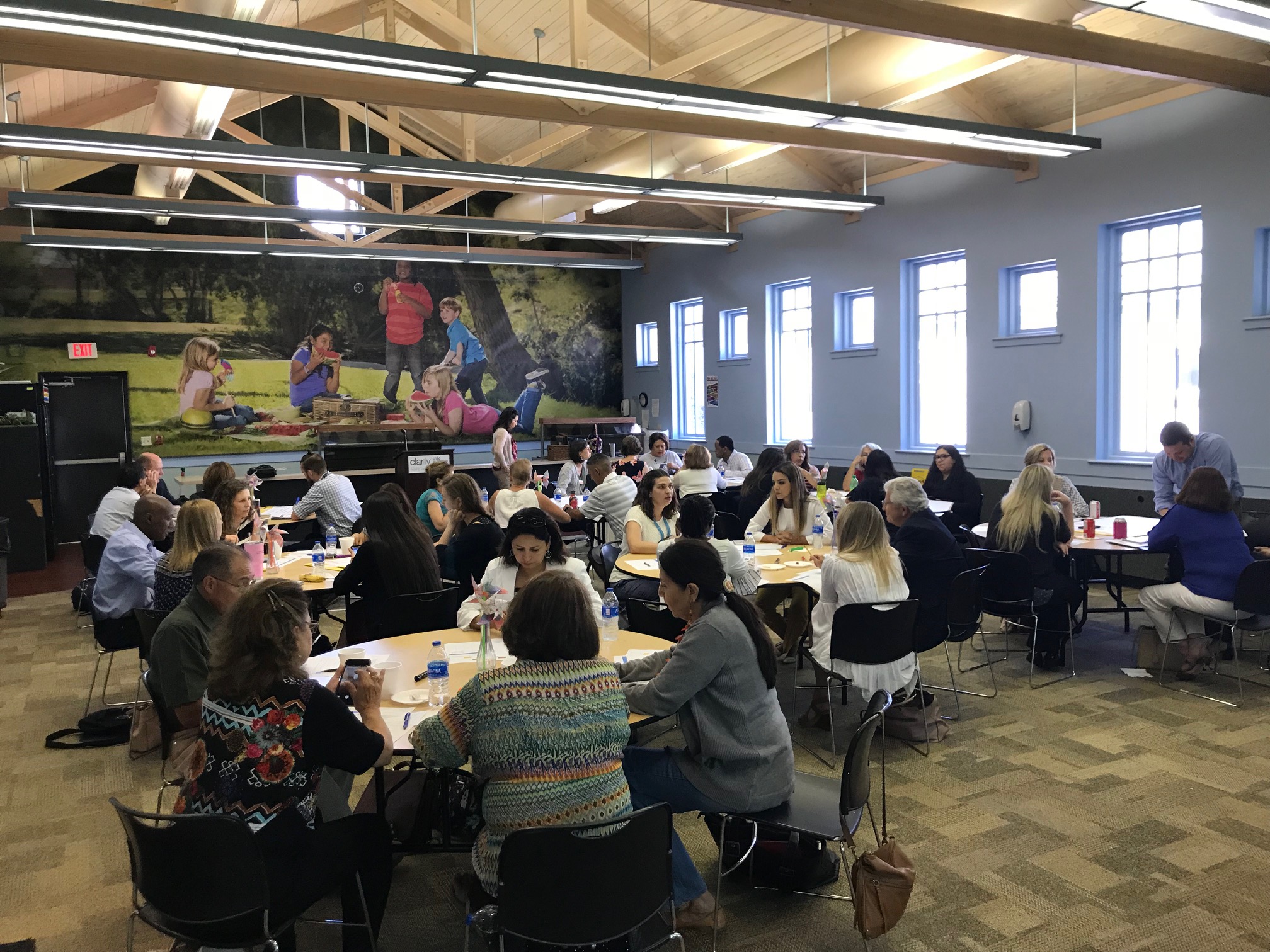
From there, Bridger, Fletcher, and Sanchez met to discuss its organizational structure and agreed to tri-chair the group.
“We decided in Bexar County to take a more comprehensive approach and work with every system in the county that has the potential to interact with children,” Bridger said.
Based on a second brainstorming session, the three tri-chairs established 11 sectors within the consortium and invited two sector leaders to co-chair each sector:
- Education/Pre K-12
- Early Care and Education Birth – 4
- Child Welfare/Foster Care
- Mental/Behavioral Health
- Medical/Hospital/Clinic
- Justice System
- Local Government
- Funding Partners
- Youth Development/Afterschool
- Faith-based/Churches
- Family Support Services
“The sector workgroups are going to devise strategies to increase awareness of ACEs and strategies to address ACEs in their sector,” Fletcher said.
Community partners who are committed to addressing the impact of trauma are invited to become members of one or more sectors.
Over 250 people have joined.
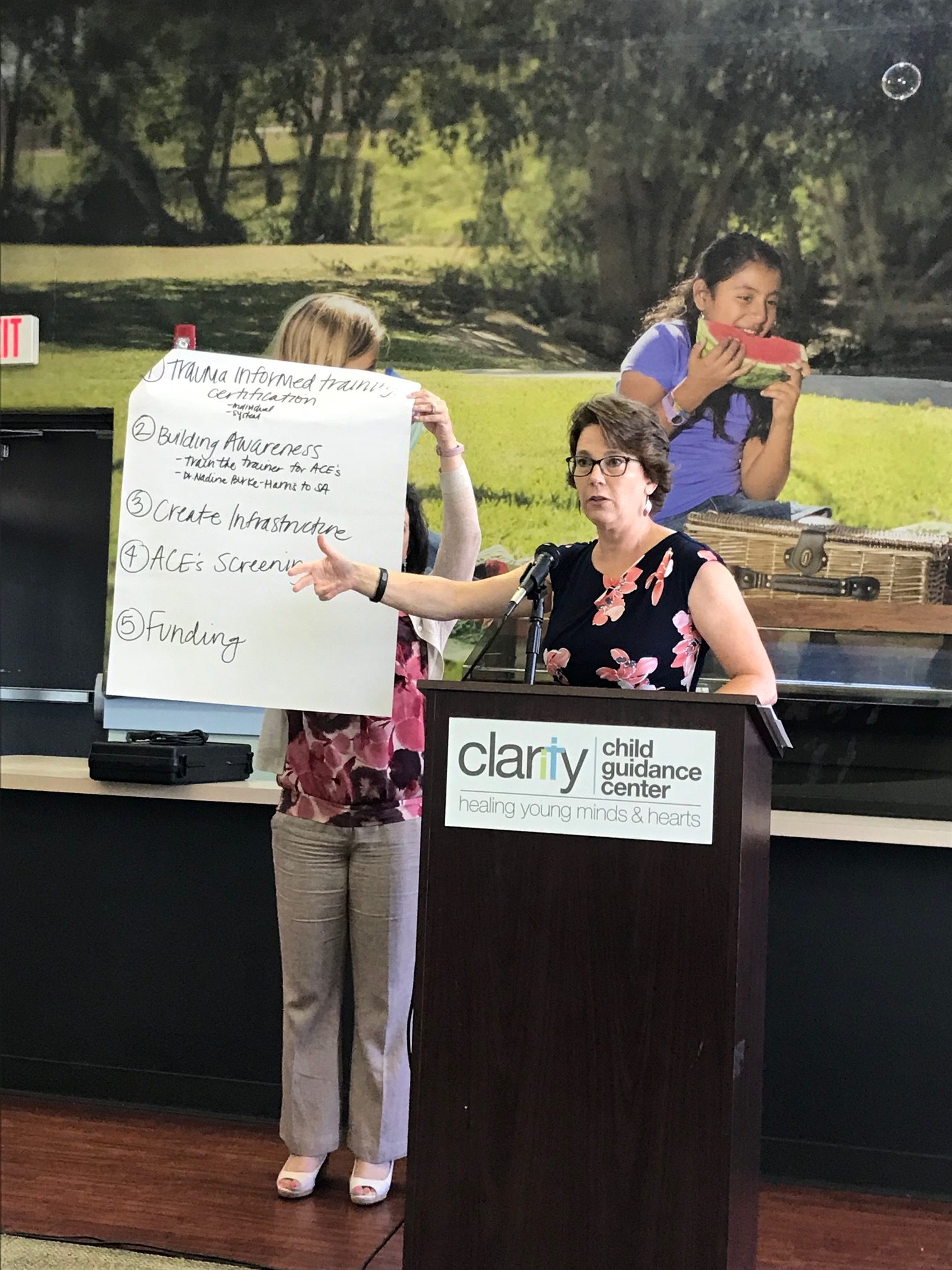
By late 2018, the tri-chairs were meeting bi-monthly with sector co-chairs; this became known as the steering committee. The entire consortium meets quarterly, and some sectors meet monthly.
“We are building the plane as we fly it,” Fletcher said.
But they would need professional support to organize meetings, take minutes, stay focused, and remain connected between meetings.
“If you rely on volunteers alone, it is an unusual group that can go the long haul. Administrative details keep the engine chugging,” Bridger said.
Bridger thought a Metro Health city staffer─dedicated specifically for trauma-informed care─could help. Fletcher and Sanchez agreed and committed to also designating staff to support the consortium.
Big Idea: Create a City-Funded Job for Trauma-Informed Care
Bridger created a job description for a trauma-informed position.
She wanted someone to improve productivity and utilization of city departments and community organizations resources and services with the goal of becoming a trauma-informed community.
As director of a municipal department with over 400 employees, she knew the knowledge, skills, and abilities needed to perform the essential job functions.
The position would work to increase community understanding of the impact of ACEs and provide facilitation and support to the newly formed Trauma-Informed Consortium.
She included the new job in Metro Health’s proposed budget for the city’s annual budget.
“We had enough in cost savings that we could do this particular improvement without having to make any reductions,” Bridger said.
The budget office, deputy city manager, and city manager reviewed and approved Metro Health’s proposed budget and included the new job in the city’s proposed annual budget.
The final step was approval from City Council.
“We have made a very compelling argument that we need to invest in as far upstream as we can go, and that [addressing children’s mental health] will benefit every other person in the city,” Bridger said, according to the Rivard Report.
New ACEs Coordinator
In September 2018, City Council voted to approve the Fiscal Year 2019 Proposed Budget—with $68,000 for a new trauma-informed staffer.
“This council seems to be very supportive and understanding of the issue, so that is a real advantage,” Fletcher said.
Connie Soria was hired as the new Adverse Childhood Experiences Coordinator and began working in January 2019.
Soria will:
- conduct ACEs presentations;
- recruit organizations to join the consortium;
- coordinate of 2 of the 11 Sector Workgroups and oversee the progress of their priorities; and
- prepare agendas for the Steering Committee, the trichair’s meetings, the quarterly Consortium meetings, and the support team.
Bridger is required to report monthly on outcomes from the new position.
Consortium Sustained, Efforts Rising
Fletcher and Sanchez also dedicated staff to support the consortium.
The three dedicated staff also are creating sector-specific facts sheets to avoid silos and provide updates across sectors.
“One challenge is that everybody is using the same words, but they don’t all mean the same thing,” Bridger said.
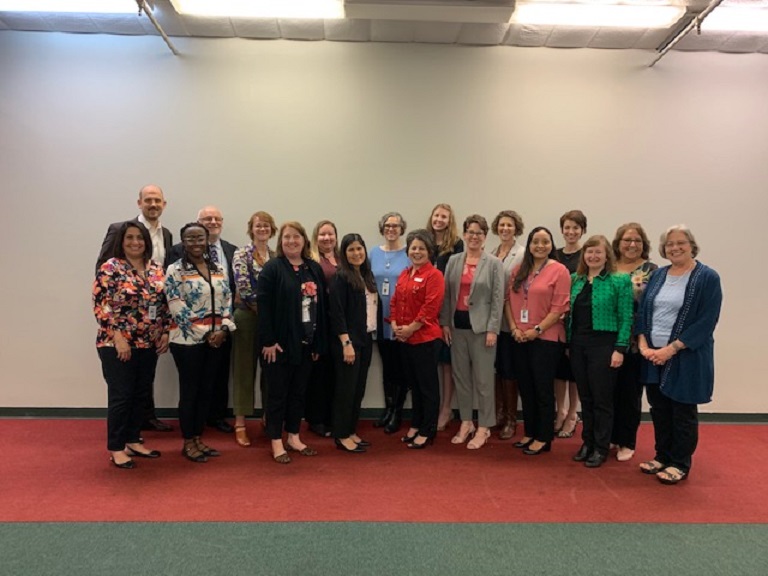
The consortium wants to develop a website to distribute information, raise awareness, and build support, including a lending library of videos, books, and resources. This would also serve as an avenue to schedule train-the-trainer training, which will remain free and open to the public.
In late 2018, Dr. Kristen Plastino with UT Health Teen Health sponsored an ACEs train-the-trainer training for 25 community members, many of whom are members of the consortium.
These trainers can provide 15-minute, 45-minute and 2-hour training for school staff, justice officers, family support services, and many other agencies and individuals.
“There are lots of organizations doing great work and they may say they are trauma-informed, but it’s only a component of the organization, not the entire organization. We want to see the entire organization,” Sanchez said. “Ultimately, we want to create a certified, trauma-informed Bexar County.”
Fletcher also recently received funding to host community screenings of the film, Resilience, The Biology of Stress and the Science of Hope. Bridger helped identify locations for screenings and individuals to serve on discussion panels on child behavior after the screenings.
“There is still an idea that corporal punishment corrects misbehavior, but if a child is in fight mode, you reinforce everything he thinks by yelling and punishing,” Fletcher said. “You reinforce fear and strengthen all the neural connections that say, ‘fight.’”
The consortium’s ultimate goal is a certified trauma-informed Bexar County.
One ongoing challenge for the group is the lack of capacity to quickly and efficiently certify consortium members and organizations in trauma-informed care.
That’s why Bridger is also interested in creating up a self-sustaining certification entity that will certify City departments and external organizations. They want everyone to be on the same page.
Bridger and her team at Metro Health also worked with the City of San Antonio Mayor and City Council and the Bexar County Judge and Commissioners Court to declare May as Trauma-Informed Care Awareness Month.
Soria put together a calendar of events to raise awareness about ACEs and trauma-informed care strategies.
“More and more public health departments are recognizing the need to address ACEs as part of their prevention-focused population health work,” Bridger said.
By The Numbers
142
Percent
Expected rise in Latino cancer cases in coming years
This success story was produced by Salud America! with support from the Robert Wood Johnson Foundation.
The stories are intended for educational and informative purposes. References to specific policymakers, individuals, schools, policies, or companies have been included solely to advance these purposes and do not constitute an endorsement, sponsorship, or recommendation. Stories are based on and told by real community members and are the opinions and views of the individuals whose stories are told. Organization and activities described were not supported by Salud America! or the Robert Wood Johnson Foundation and do not necessarily represent the views of Salud America! or the Robert Wood Johnson Foundation.



